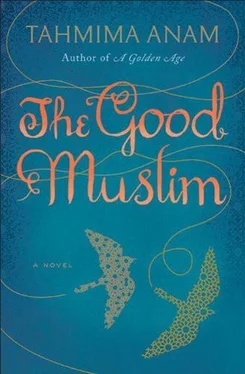That’s what she had told Aditi, when she had called and asked if she could visit the newspaper office. But suddenly she wasn’t sure any more — it had been years since she’d picked up a pen. ‘Well, I thought — I did some writing during the war.’
‘You have something you want to say?’ Shafaat lit another cigarette, threw the match on the ground. A young boy in a tattered vest and lungi entered with a broomstick and pan and began to shift the dust to the corners of the room.
‘Something about village life, I guess.’
‘You mean all that bucolic I-love-the-countryside crap?’
‘No, nothing like that. About what’s really going on out there, sort of like a memoir. I was there for seven years, I saw a lot.’
‘All right, 500 words by next week. Let’s see what you come up with. But please, don’t write any sentimental drivel about the green valleys of Rajshahi, eh?’
She smiled. ‘All right.’
‘You sure your husband won’t mind?’
‘Does Aditi’s husband mind?’
Aditi looked up from her desk. ‘He’s too busy playing golf. I just ignore him.’
‘So, yours will?’
‘Stop harassing her, Shafaat, she’s not married.’
He raised his eyebrows. She imagined what he was thinking — poor girl, still without a husband. But he surprised her by giving her a thumbs-up. ‘I have a daughter, and I tell her, marriage only if she meets a prince. Otherwise men are bastards.’
‘My,’ she said, ‘I could sign you up right now — first male feminist of Bangladesh.’
‘Do it!’ he said, slamming his fist on to the table. ‘We’ll make an official announcement in the next issue.’
‘You’ll be a celebrity,’ Aditi said drily. ‘Now come with me, Maya, I’ll show you the rest of our humble establishment.’ They went down a corridor and into a smaller room. There was a desk at the back with a large rectangular box on top. ‘You’d better look out for Shafaat, he’s a flirt.’
‘He reminds me of my brother.’ There was something about the way he thumped his hand on that desk that brought back a flash of Sohail.
‘Really, I thought your brother had gone the religious way.’
‘He was different before.’ No one seemed to remember the old Sohail. They heard he had become a mawlana and forgot how he had been before. Only Maya had archived his image — hands wedged into his jeans, the cap he wore with a red star in the middle.
Aditi showed her the typesetting machine. She had to take every letter of every word and slot it neatly into a groove. The words were then dipped into the ink and pressed on to the paper. ‘Try it,’ Aditi said. Maya pulled out a few letters, arranged them on a tray. Dipped into black ink. MynameisMayaHaque .
‘You have to remember the spaces between the words, Doctor.’
*
The typewriter’s keys were tight. Probably angry with her for all the years it had spent under Ammoo’s bed. There was a time you couldn’t take it from her; she would bring it to the table and tap away while eating her dinner. And when she wasn’t banging on the keys, she was scribbling on anything she could find, an old newspaper, a piece of brown paper that the vegetables had been wrapped in. Now she struggled to find the words. Chronicles of a Crusading Doctor ? That sounded pompous. There was nothing so lofty about what she had done. She began to write about the Dictator, the sight of him tossing flowers on the Martyrs’ Memorial. She tore the paper out of the typewriter. No one wanted to read about that. Five hundred words on the true story of the countryside. The true story. She remembered all the children she had brought into the world, all the mothers she hadn’t been able to save. She thought of Nazia — Nazia who had been punished because it was the hottest day of the year and she wanted to cool her feet. She started at the beginning. I once knew a girl called Nazia . What was she thinking — she couldn’t use real names. Nazia. Zania. Inaaz. Aizan. I once knew a girl called Aizan.
Sohail’s friends couldn’t understand his conversion, because they hadn’t really grasped what had come before. They had thought his life was full of happiness; they used words like jolly and cheerful to describe him. Happy-go-lucky. Happy and lucky, jolly and laughing, bell-bottomed. Rock and rolled. Before he found God. They remembered how good-looking he was, and that he showed his teeth when he smiled.
Had they known him better, they would have seen that the teeth, the smiling, the happy and the lucky had been taken by the war. By a girl whose captors had shaved her head so that she could not hang herself. Purdah, the preaching — all of this followed naturally, filling the hole left behind by his old mutinies.
And people misremember about the Book. They assume that Silvi gave him the Book and told him to read it, because by the end of the war Silvi had lost her husband and already found God, and she had defied everyone and been the first to cover her head, to turn her back on her country and face life after life.
But it was Rehana who had given Sohail the Book, a few months after he returned from the war. This was how it happened.
It is a Wednesday, Rehana’s shopping day, and she is walking along New Market, wondering how high the prices have risen since last week, wondering if she can afford a chicken, a half-leg of mutton, when she sees, across the road, someone familiar. Her own son. She catches the barest glimpse, but she is sure it’s him. He is getting down from a rickshaw, and she lifts her hand, is about to call out, but he looks beyond her, his face changing. He crosses the road, approaching her but not seeing her, and now he is both her son and not her son, as he walks directly past her. She turns to see what he sees: a man in another rickshaw. He approaches the man, says not a word, hauls him out of the rickshaw and punches him in the face. Three times, three punches. Then he turns and walks towards her, the muscles in his back rippling, telling her he knows this man, that this man has done terrible things, that he has seen these terrible things, and she knows now that these are the visions that have him pacing the hallway at night, the ones that leave his pillows wet and his mouth frozen stiffly, even as he tries to smile and act as if everything has gone back to normal.
And, not knowing what else to do, because he has asked her never to speak about it, she gives him the Holy Book. The book has helped her through so many difficult times, times she could not imagine surviving. But he shakes his head, because he has come to believe that the Book was part of the problem, before the war, before Bangladesh. Because people were attached to the Book, or their idea of the Book, more than to each other, or to their neighbours, or to their country. They had called themselves revolutionaries, and believed that faith was beneath them, a consolation for simpler, lower minds. Sohail turns his face from the Book and waves his mother away.
This wounds her, because she too has her memories, of her son, a boy who would not dismiss his mother, who would not punch a stranger in the street. That her son has seen, and committed, acts of violence, is not surprising to her — but she cannot account for the lingering of his passions so long after the end of the battle.
Sohail rejects the Book. He lets it gather dust on his desk, and then he shelves it away high, where its spine is not in his sight.
She decides to read to him. You don’t have to listen, she says, just sit with me.
This was how it began. It hurt her to remember this, because everything that happened afterwards could be traced to Sohail’s first steps towards God, beginning with the Book that she gave him, that gathered dust on his bookshelf, that she prised from between Neruda and Ghalib, that she read aloud while he ate his breakfast, that he was unable to resist, that he began to memorise, then understand, then love, that finally fell into his hands as he learned to read, that wove itself into his heart — that led to revelation and his conversion, the alchemy of which none of his loved ones could trace to a single moment, a single gesture.
Читать дальше












